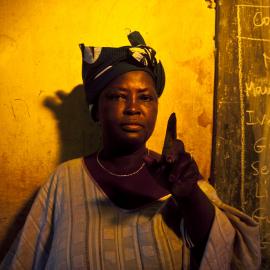In her article on the Ebola crisis (“Ebola’s Lessons,” September/October 2015), Laurie Garrett makes several incorrect claims related to the funding and structure of the health systems of Liberia and Sierra Leone, where I serve as Ireland’s ambassador.
Garrett correctly describes Liberia’s Health Sector Pool Fund as “a single pot of carefully monitored funds for the nation’s desperate government health-care system.” Yet Garrett errs in writing that the fund has “about a dozen donors”; in fact, it has only four. Of these, Ireland is the lead donor; together with the United Kingdom, it has contributed over 80 percent of the fund’s capital since its formation in 2008.
Garrett goes on to claim that the “pool fund budget had no flexibility to allow for an unexpected catastrophe such as an epidemic.” In fact, flexibility is part of the pool fund’s raison d’être: unlike much of the Liberian Ministry of Health’s other financing, the pool fund is not earmarked for specific purposes, and the Ministry of Health makes proposals for funding based on critical gaps in the health system. This flexibility was vital during the Ebola crisis, which could not have been foreseen in annual plans or budgets. The fund’s donors accepted all of the Ministry of Health’s requests during the outbreak, after the necessary technical and financial quality checks.
Indeed, one of the key lessons of the Ebola crisis is that although funds targeting specific health programs are important in their own right, overemphasizing them can leave some critical health needs underfunded. During a crisis, this gap can have serious consequences. More development partners should consider supporting national health systems through flexible, government-owned mechanisms, such as the pool fund.
Much of the analysis and media coverage of the Ebola crisis has suggested that the health systems of the affected countries were practically nonexistent; Garrett, for example, writes that Liberia “barely had a health-care and hospital system or even a method for processing public-sector payrolls” when the Ebola outbreak began. In fact, although enormous challenges remain, there have been significant improvements in the health systems of both Liberia and Sierra Leone since the end of their respective civil wars in the early years of this century. Instead of discounting what has been achieved, it would be more fruitful to look at why these states have not improved even more and why some health-care investments made before the Ebola outbreak were not as effective as was hoped. Such analysis would undoubtedly reveal the importance of flexible funding mechanisms led by host governments.
SINEAD WALSH
Ambassador of Ireland to Sierra Leone and Liberia
GARRETT REPLIES:
Ambassador Sinead Walsh is right to note that Ireland has been a major contributor to Liberia’s Health Sector Pool Fund and merits applause for its long-standing commitment. The fund represented a smart innovation in financing, and such assistance was particularly important during the Ebola crisis, which was made more acute by the ongoing effects of Liberia’s civil war and dire underdevelopment, including an underfunded and understaffed health sector. However, most foreign aid for Liberia’s battle with Ebola arrived long after the epidemic peaked in late September 2014. In the end, the people and government of Liberia overcame the outbreak largely without the level of external support they needed and deserved.
